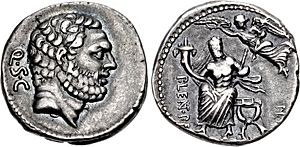Publius Cornelius Lentulus Spinther facts for kids
Publius Cornelius Lentulus Spinther (born around 100 BC – died 47 BC) was an important Roman politician and general. He came from a famous noble family called the Cornelii. Spinther helped stop a plot against Rome called the Catilinarian conspiracy in 63 BC. He later became a consul, one of Rome's top leaders, in 57 BC.
He wanted to lead an army into Egypt but wasn't allowed. Still, he won battles in his province of Cilicia and celebrated a special parade called a triumph in 51 BC. When Caesar's civil war began, he chose to support Pompey and the Roman Senate. Caesar captured him but then pardoned him. Spinther then joined Pompey's forces in Greece. He was last mentioned in early 47 BC.
Contents
Early Life and Political Start
Publius Cornelius Lentulus Spinther belonged to the well-known patrician family, the Cornelii. He had a father with the same name. He got the nickname "Spinther" because people said he looked like a famous actor. His younger brother, Lucius Cornelius Lentulus Crus, also became a consul in 49 BC.
Spinther began his public career in 74 BC as a quaestor urbanus. A quaestor was a Roman official who managed money. During his time as quaestor, he made denarii coins. These coins showed a spirit called Genius Populi Romani. This was meant to show that the war against Sertorius in Spain was fair.
Helping Rome as Aedile
In 63 BC, Spinther became a curule aedile. Aediles were officials who oversaw public works and games. This was the same year Cicero was consul and the Catilinarian conspiracy happened. Spinther helped Cicero stop this plot. He held one of the plotters, Publius Cornelius Lentulus Sura, in custody. Spinther also put on amazing public games that were better than those of previous aediles. He even used silver to decorate the stage equipment!
After being an aedile, he served as an urban praetor in 60 BC. A praetor was a high-ranking judge or magistrate. In the same year, he was chosen as one of the pontifices, who were important priests. After his time as praetor, he became the governor of Hispania Citerior (a part of Spain). He likely had proconsular status, meaning he had the power of a consul. He governed there for the year 59 BC. During his time as governor, he made coins that included his nickname, "Spinther." This shows that "Spinther" was officially used to tell him apart from other people named Cornelius.
Consul and Governor of Cilicia
In 58 BC, Spinther ran for consul, one of the highest positions in Rome. He received support from powerful figures like Julius Caesar and Pompey. Caesar had been friendly with Spinther for a while, helping him become a priest and get his governorship in Spain. Spinther was elected first consul for 57 BC. He was joined by Quintus Caecilius Metellus Nepos, who was an enemy of Pompey.
Bringing Cicero Home
On January 1, 57 BC, the new consular year began. Spinther successfully convinced the Senate to bring Cicero back from exile. His fellow consul, Nepos, had been against it at first. Spinther then helped pass a law to make Cicero's return official. He also helped Cicero get his house back, which had been taken during his exile.
Governing Cilicia
Spinther became the proconsul (governor) of Cilicia, a Roman province that also included the island of Cyprus. The Senate gave him instructions to get involved in a royal dispute in Egypt. He was told to help Ptolemy XII Auletes get his throne back. However, he stopped when a Sibylline oracle (a prophecy) said that using an army for this was forbidden.
Spinther governed Cilicia from 56 to 54 BC. During this time, he was called imperator, a title given to successful military commanders. He also made large silver coins in a city called Apameia. These coins had his name on them: P LENTVLVS P F IMPERATOR. He returned to Italy in 53 BC but stayed outside the city walls. He hoped to celebrate a triumph, a special parade for military victories. He waited for two years before finally celebrating his triumph in late 51 BC.
The Roman Civil War
Before Caesar's civil war started, Spinther played a part in stopping an extension of Caesar's term. According to some accounts, he voted against it in 50 BC.
When the war began in 49 BC, Spinther quickly sided with Pompey against Caesar. He joined Domitius Ahenobarbus in trying to fight Caesar at Corfinium. However, Caesar's forces surrounded them. Spinther and other leaders were forced to surrender. Caesar surprised everyone by pardoning them and letting them go free.
After some thought, Spinther rejoined Pompey and his army in Greece. Cicero wrote a letter to Caesar, thanking him for being kind to Spinther. However, Spinther privately believed Caesar's kindness was just a trick.
In 48 BC, Pompey's main army faced Caesar's army at the Battle of Pharsalus. Spinther fought in this battle, which was a huge defeat for Pompey's side. Pompey fled to Egypt, where he was sadly killed. Spinther escaped to Rhodes, an island, where he was eventually given a safe place to stay.
Later Life and Family
Some historical accounts suggest Spinther died in 48 BC. However, other writings imply he lived until early 47 BC.
Spinther had a son who was also named Publius Cornelius Lentulus Spinther. This younger Spinther later joined Brutus and Cassius, who were Caesar's assassins. He made coins for them during their own civil war against Mark Antony and Octavian. Like his father, the younger Spinther put his name and nickname "Spinther" on his coins. These coins also showed the head of 'Liberty'.
Spinther was married to Caecilia Metella.
See also
 In Spanish: Publio Cornelio Léntulo Espínter para niños
In Spanish: Publio Cornelio Léntulo Espínter para niños
- List of Roman consuls
 | Stephanie Wilson |
 | Charles Bolden |
 | Ronald McNair |
 | Frederick D. Gregory |


